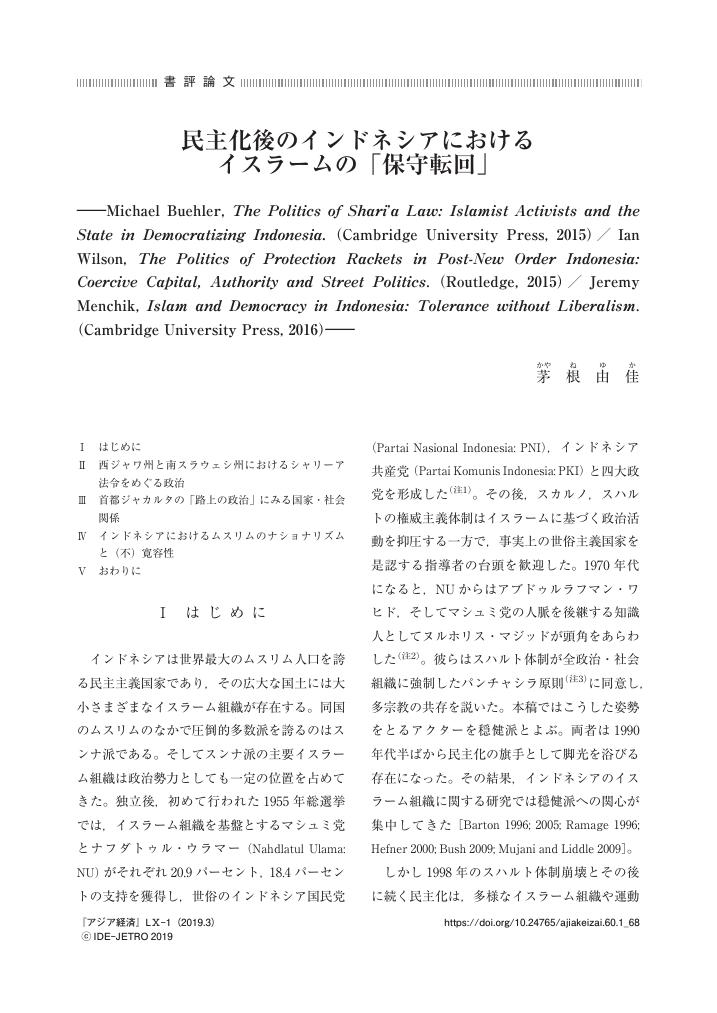2 0 0 0 OA 現代インドネシアにおけるシーア派排斥運動の台頭とその限界
- 著者
- 茅根 由佳
- 出版者
- 京都大学大学院アジア・アフリカ地域研究研究科
- 雑誌
- アジア・アフリカ地域研究 (ISSN:13462466)
- 巻号頁・発行日
- vol.19, no.1, pp.28-48, 2019-09-30 (Released:2019-11-02)
- 参考文献数
- 77
Indonesia’s largest Sunni Islamic organization, Nahdlatul Ulama (NU), has embraced moderation and tolerance of religious minorities, under the leadership of religious pluralists. Academic works on Indonesia’s Islam have often attributed hostile and exclusive attitudes toward religious minorities, especially toward Shi’a, to groups under influence of Wahhabism. Observers of Indonesia’s Islam in the past decade, however, have witnessed increasing violence against religious minorities by NU members using similar rhetoric to that deployed by Wahhabi-inspired groups. What accounts for the emerging trend of intolerance? Specifically, what motivates certain NU members to engage in persecution of minorities? This paper shows that the power struggle within the organization primarily motivates rank-and-file individuals to mobilize the masses by using anti-minority rhetoric with the aim of jeopardizing the moderate leadership and advancing their own standing. Among the emerging opponents of the pluralist leadership are disciples of Sayyid Muhammad Alawi al-Maliki (1944–2004) in Mecca. Despite the moderate teaching of al-Maliki, some disciples who seek influence beyond the organization are increasingly using anti-Shi’a rhetoric to mobilize the masses in this electoral democracy. The paper explores their historical trajectory, and then analyzes development after the democratization as well as the limitations that prevent them from expanding their influence at the national level.
- 著者
- 茅根 由佳
- 出版者
- 独立行政法人 日本貿易振興機構アジア経済研究所
- 雑誌
- アジア経済 (ISSN:00022942)
- 巻号頁・発行日
- vol.60, no.1, pp.68-78, 2019-03-15 (Released:2019-03-27)
- 参考文献数
- 19
- 著者
- 茅根 由佳
- 出版者
- 京都大学大学院アジア・アフリカ地域研究研究科附属イスラーム地域研究センター
- 雑誌
- イスラーム世界研究 = Kyoto bulletin of Islamic area studies (ISSN:18818323)
- 巻号頁・発行日
- vol.11, pp.207-224, 2018-03
1 0 0 0 IR インドネシアの首都ジャカルタ水道事業と民営化政策をめぐる攻防
- 著者
- 茅根 由佳
- 出版者
- 京都大学東南アジア研究所
- 雑誌
- 東南アジア研究 (ISSN:05638682)
- 巻号頁・発行日
- vol.51, no.1, pp.139-161, 2013
This paper analyzes the water privatization process in Jakarta, Indonesia, focusing on the changes in policy after the fall of Suharto in 1998, to show the strategic adaptation of domestic business elites to survive after the drastic transition period. During the Suharto era, business elites were able to accumulate capital by drawing patronage from former President Suharto. However, the democratization of the country led to Suharto's ouster and disordered the former interest structure, which was deeply entrenched in the Indonesian political economy. Today concessions in water privatization are no longer sustained by merely relying on the political authority. In Jakarta, the center of Indonesia's politics and economy, agreements with Suharto guaranteed private corporate interests with lucrative business relating to city development. Recently, however, private businesses, especially those managing public infrastructure, have become increasingly vulnerable to aggres sive public backlash and supervision by the regulatory bodies of the provincial government. Despite this increasing vulnerability, domestic business elites have succeeded in regaining their lucrative concessions by seizing opportunities and cooperating with the capitals of foreign countries. These business elites have successfully adapted to the changing democratic nvironment with sophisticated strategies and shrewd risk management.
1 0 0 0 インドネシアの首都ジャカルタにおける開発行政とビジネス
本年度の前半期には、まず、インドネシア政治に関する既存研究によって得られた知見と比較検討した。既存研究のまとめ作業を行うに際して、関連のインドネシアの政党政治研究であるマルクス・ミーツナー(Marcus Mietzner)の近著Money Power and Ideology: Political Parties in Indonesia.の書評を執筆した。また、本年度の後半期からは、1年次から2年次にかけてインドネシアのジャカルタで収集した資料をとりまとめる作業に集中した。本研究で得られた考察を発展させ、来年度中に博士論文を書き上げることを前提として、現時点での研究成果を発表するために関連の学術誌(『アジア研究』等)に論文「民主化期のインドネシアにおける石油天然ガス政策と政治過程の変化 -チェプ鉱区権益問題を事例として- 」を投稿している。本論文においては、インドネシアの資源政策においては、大統領及び執政府が石油ガスなどの資源産業の生産性を維持するため、積極的に外国投資を誘致してきたのに対し、野党政治家を始めとする議会が国有企業を支援してこれに対決姿勢を強めた過程を検討した。本論文が分析対象とした、2004年から2009年までの第1期ユドヨノ政権においては、資源政策における執政府の主導権が確立されていたが、2009年から2014年までの第2期ユドヨノ政権では経済ナショナリズムの圧力が強まり、政府外アクターや憲法裁の影響力が政策方針を変化させようとしていくこととなった。こうした第2期ユドヨノ政権における資源政策をめぐる政治過程の変化については論文を執筆中であり、東南アジア研究に投稿したいと考えている。
